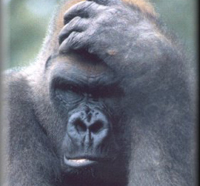Apes meticulously plan their future too
What are you going to do tomorrow? And what about the vacation? You don’t know? Shame on you. Even the monkeys can plan their future actions and time.

Humans are not the only ones who can think about what they might do in the future, as research has shown that apes such as bonobo chimpanzees and orangutans may also have the skills of thinking ahead, scientists reported on Thursday.
Most scientists believed that planning for future needs, not just current ones, is one of the most formidable human cognitive achievements.
But now a German team doubt whether this skill is uniquely held by humans. It found that bonobos and orangutans could choose a suitable tool to reach a treat, carry the tool away and return with it to retrieve a treat later.
These findings will appear in the May 19 issue of U.S. journal Science, xinhuanet.com reports.
The research was led by Josep Call, co-director of the Planck Institute's Wolfgang Köhler Primate Research Center.
Call said that the apes performed the same kind of planning that humans engage in.
The first of Call's experiments involved five orangutans and five bonobos, long-limbed cousins of chimpanzees.
The animals first learned how to use a suitable tool to gain access to the food in the apparatus. Then the animals were given five minutes to familiarize themselves with a whole series of tools—two tools that were suitable for getting the food and six that were unsuitable.
After the five minutes, the animals were taken to a waiting room, along with the tools.
One hour later they were allowed to return. To get the food, they had to select a suitable tool and bring it with them.
The apes succeeded in selecting the right tool an average of 7 times in 16 trials.
A second experiment increased the delay to 14 hours, testing one bonobo and one orangutan. While neither ape took suitable tools in the first trial, the orangutan took the right tool in the succeeding 11 tests. The bonobo succeeded in 8 of the following trials, according to nationalgeographic.com.
In a separate paper in ScienceExpress, the electronic version of Science, researchers report that scrub jays look over their shoulders when hiding food for future use and, if they think another bird saw where they put it, will relocate their cache.
The report by Nicola S. Clayton and colleagues at the University of Cambridge in England noted that relocating food was common when a bird thought it had been observed by a more dominant bird, but not when a partner was present.
The findings indicate that the birds act to avoid the possibility that a non-partner will raid their stored food, and remember who was around when they hid it, washingtonpost.com reports.
Source: agencies
Prepared by Alexander Timoshik
Pravda.ru
Subscribe to Pravda.Ru Telegram channel, Facebook, RSS!




